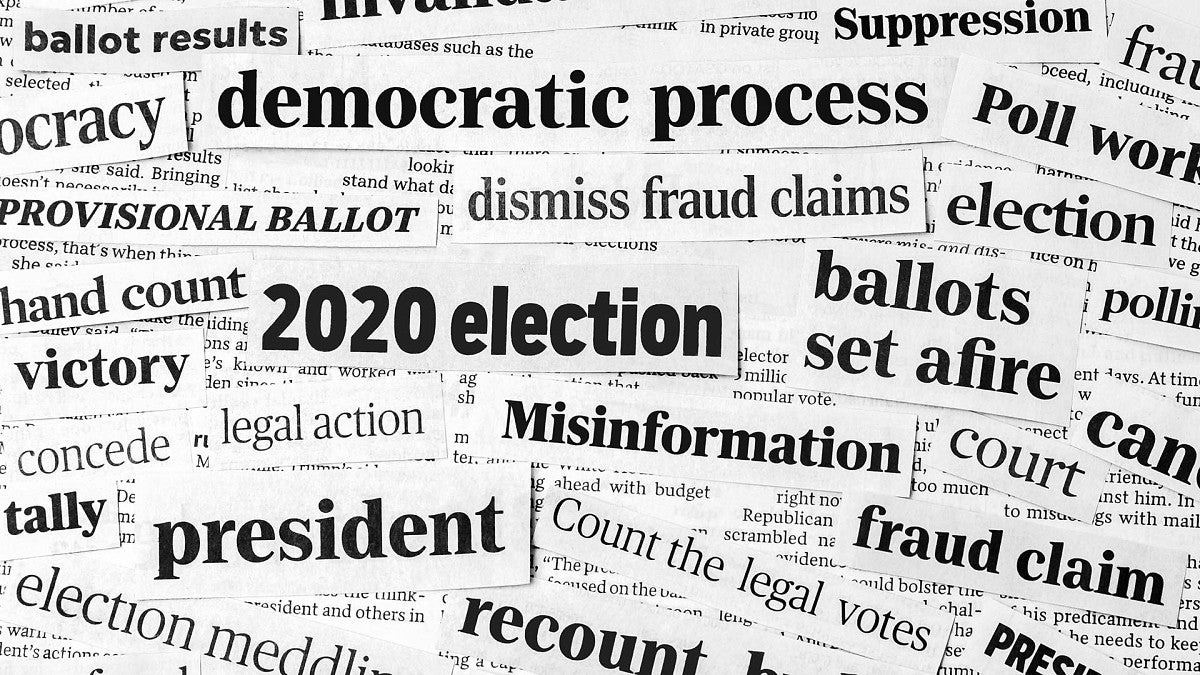While it’s healthy to question what we see and hear in the media, those quick internet searches to fact-check news stories can unexpectedly backfire and lead people to believe false stories, according to the director of the University of Oregon’s undergraduate journalism program.
As more people tune into the press for the upcoming election cycle, Seth Lewis, who holds the Shirley Papé Chair in Emerging Media at UO's School of Journalism and Communication, said caution is in order when trying to verify media accounts.
For those who plan to cast a vote in this year’s statewide and presidential elections, not knowing what media sources and stories to trust can lead one to end up more misinformed.
“The big takeaway is there are social costs to not trusting journalists and institutions,” Lewis said. “There’s the cost of encountering poor-quality information and the cost in time that could be spent on other activities besides trying to fact-check the news."
Drawing on interviews conducted in 2020, a time when people were relying heavily on the news for guidance on the COVID-19 pandemic, Lewis and his University of Utah colleague Jacob L. Nelson found that Americans had greater faith in their abilities to fact-check the news than they had in the news itself. Many of those interviewed reported feeling the need to “do their own research” using search engines because of their distrust in journalism as biased and politicized.
But those who reject journalism in favor of their own internet research can wind up more misinformed, falling into conspiracy theories, rabbit holes and low-quality data voids, a problem heightened during election season, Lewis said.
As supported in recent work by a different set of researchers, which appears in the journal Nature, when people were encouraged to do additional searching after reading true and fake stories on the COVID-19 pandemic, for example, they were more likely to believe in fake news than those who hadn’t performed an online search.
As ballots for Oregon’s statewide election hit mailboxes in May and the 2024 presidential campaign heats up, equipping voters with the tools to more effectively navigate the infinite information environment can increase their access to high-quality news sources, research shows.
In their 2020 interviews, Lewis and Nelson found that frustration and distrust in the news surprisingly crossed partisan lines. People who were interviewed shared the sentiment that only “sheep” would trust journalists and also had a common desire to better understand the world. Yet to uncover that clear, accurate picture, information seekers must challenge not only a news source’s biases and reputability but also one’s own biases that might influence what stories they trust or dismiss, Lewis said.
“That skepticism should be applied as much to ourselves as to others,” he said. “You should be a little bit skeptical of your own opinions.”
Waning trust in news media can be traced back to the 1970s and has been rapidly accelerating in recent years because of several challenging crises the United States has faced, Lewis said.
“We're in a moment where we are increasingly realizing that news is both everywhere and nowhere,” he said. “News is all around us yet seems to have, in some sense, less impact than it did before. It's never been easier to stumble upon news, but people often talk about being exhausted by it and, therefore, are turning away from it at unprecedented levels.”
Journalists can do better to earn the public’s trust, Lewis said. Many individuals don’t see journalists as experts nor have a strong relationship with them as they do with their doctors, for example.
Although there is a fair bit of distrust in both journalism and health care as institutions, people are more trusting of individual doctors and don’t feel the need to fact-check them as they do for individual journalists, Lewis found in a 2023 study published in the journal Media and Communication.
“But journalists are experts,” Lewis said. “They are experts in finding accurate information and trying to present it in a professional manner, but they can also do better in presenting themselves as practitioners with expertise.”
Bringing transparency into the practice of journalism can illuminate what some people see as a black box. In their latest research study, published April 25 in the research publication Journalism, Lewis and his team noticed in interviews that many Americans perceived journalists as motivated by profits. But in reality, most journalists are paid rather poorly and are motivated more by passion than pursuit of profit, he said. Widespread job cuts also have hit the industry, with hundreds of journalists laid off at the start of 2024.
A disconnect exists between how people perceive journalism and how it actually works, and journalists should share the principles, techniques and challenges that go into it, Lewis said.
Journalists can also embrace more public engagement in their work. For instance, Lewis’ UO colleague Ed Madison leads the Journalistic Learning Initiative, which gives middle- and high-schoolers the opportunity to learn journalistic techniques, become more media literate and tell factual stories about their world.
“What it takes to build trust in journalism is the same as anywhere else,” Lewis said. “By building relationships.”
— By Leila Okahata, University Communications


